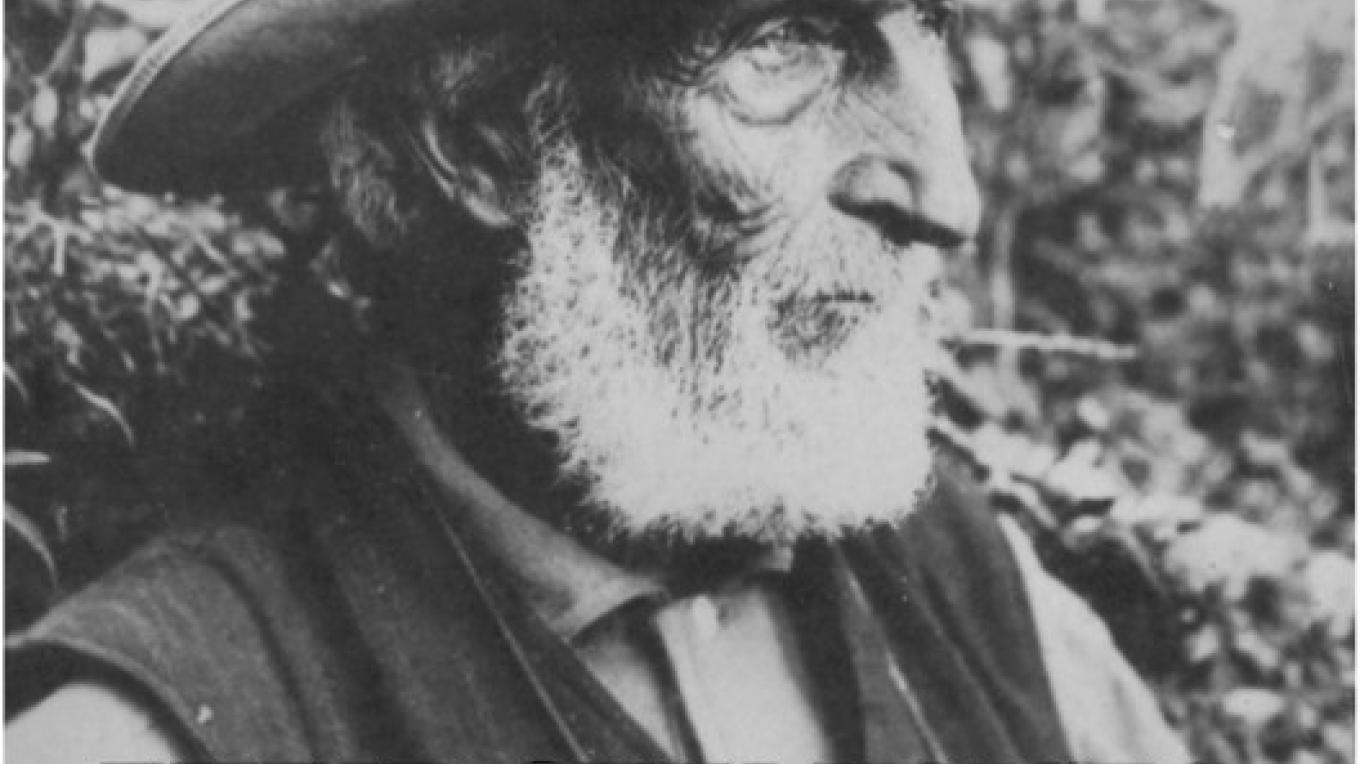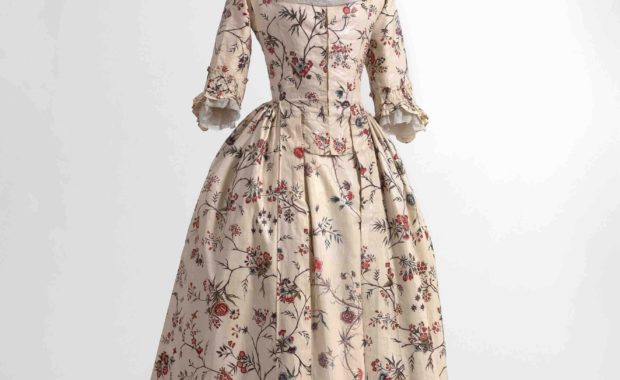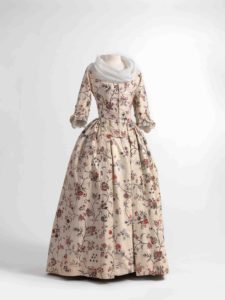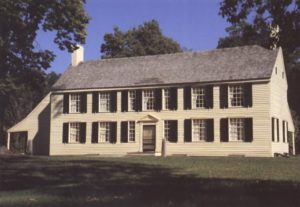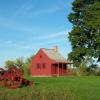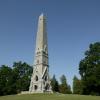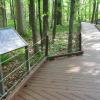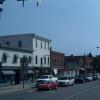WHEN the last ships came from Quebec, a report prevailed in Canada, said to have been founded upon positive evidence, that the rebels had laid the keels of several large vessels at Skenesborough and Ticonderoga, and were resolved to exert their utmost powers, to construct a new and formidable fleet during the winter.
I will not, however, give credit to their exertions, in such a degree as to imagine the King’s troops will be prevented passing Lake Champlain early in the summer, but will suppose the operations of the army to begin from Crown Point.
But as the present means to form effectual plans is to lay down every possible difficulty, I will suppose the enemy in great force at Ticonderoga; the different works there are capable of admitting twelve thousand men.
I will suppose him also to occupy Lake George with a considerable naval strength, in order to secure his retreat, and afterwards to retard the campaign; and it is natural to expect that he will take measures to block up the roads from Ticonderoga to Albany by the way of Skenesborough, by fortifying the strong ground at different places, and thereby obliging the King’s army to carry a weight of artillery with it, and by felling trees, breaking bridges, and other obvious impediments, to delay, though he should not have power or spirit finally to resist, its progress.
The enemy thus disposed upon the side of Canada, it is to be considered what troops will be necessary, and what disposition of them will be most proper to prosecute the campaign with vigour and effect.
I humbly conceive the operating army (I mean exclusively of the troops left for the security of Canada) ought not to consist of less than eight thousand regulars, rank and file. The artillery required in the memorandums of General Carleton, a corps of watermen, two thousand Canadians, including hatchet-men and other workmen, and one thousand or more savages.
It is to be hoped that the reinforcement and the victualing ships may all be ready to sail from the Channel and from Corke on the last day of March. I am persuaded that to sail with a fleet of transports earlier, is to subject government to loss and disappointment. It may reasonably be expected that they will reach Quebec before the 20th of May, a period in full time for opening the campaign. The roads, and the rivers and lakes, by the melting and running off of the snows, are in common years impracticable sooner.
But as the weather long before that time will probably have admitted of labour in the docks, I will take for granted that the fleet of last year, as well bateaux as armed vessels, will be found repaired, augmented, and fit for immediate service. The magazines that remain of provision, I believe them not to be abundant, will probably be formed at Montreal, Sorel and Chamblée.
I conceive the first business for those entrusted with the chief powers, should be to select and post the troops destined to remain in Canada; to throw up the military stores and provision with all possible dispatch, in which service the above-mentioned troops, if properly posted, will greatly assist; and to draw the army destined for ope∣ration to cantonments, within as few days march of St. John’s as conveniently may be. I should prefer cantonments at that season of the year to encampment, as the ground is very damp, and consequently very pernicious to the men, and more especially as they will have been for many months before used to lodgings, heated with stoves, or between decks in ships; all these operations may be put in motion together, but they severally require some observation.
I should wish that the troops left in Canada, supposing the number mentioned in my former memorandum to be approved, might be made as follows.
|
Rank and File. |
| The 31st regiment, British, exclusive of their light company of grenadiers |
448 |
| Maclean’s corps |
300 |
| The 29th regiment |
448 |
| The ten additional companies from Great Britain |
560 |
| Brunswick and Hesse Hanau to be taken by detachments or complete corps, as Major General Reidesel shall recommend, leaving the grenadiers, light infantry and dragoons compleat |
650 |
| Detachments from the other British brigades, leaving the grenadiers and light infantry complete and squaring the battalions equally |
600 |
|
3006 |
My reason for selecting the 31st regiment for this duty is, that when I saw it last it was not equally in order with the other regiments for services of activity.
I propose the 29th regiment as it is not at present brigaded.
I propose Maclean’s corps, because I very much apprehend desertion from such parts of it as are composed of Americans, should they come near the enemy.
In Canada, whatsoever may be their disposition, it is not so easy to effect it.
And I propose making up the residue by detachment, because by selecting the men least calculated for fatigue or least accustomed to it, which may be equally good soldiers in more confined movements and better provided situations, the effective strength for operation is much greater and the defensive strength not impaired.
I must beg leave to state the expeditious conveyance of provision and stores from Quebec, and the several other depositaries, in order to form ample magazines at Crown Point, as one of the most important operations of the campaign, because it is upon that which most of the rest will depend. If sailing vessels up the St. Lawrence are alone to be employed, the accident of contrary winds may delay them two months before they pass the rapids of Richelieu, and afterwards St. Peter’s Lake; delays to that extent are not uncommon, and they are only to be obviated by having a quantity of small craft in readiness to work with oars. From the mouth of the Sorrel to Chamblée, rowing and tacking is a sure conveyance if sufficient hands are found. From Chamblée to St. Therese (which is just above the Rapids) land-carriage must be used, and great authority will be requisite to supply the quantity necessary.
A business thus complicated in arrangement, in some parts unusual in practice, and in others perhaps difficult, can only be carried to the desired effect by the peremptory powers, warm zeal, and consonant opinion of the governor; and though the former are not to be doubted, a failure in the latter, vindicated, or seeming to be vindicated, by the plausible obstructions that will not fail to be suggested by others, will be sufficient to crush such exertions as an officer of a sanguine temper, entrusted with the future conduct of the campaign, and whose personal interest and fame therefore consequentially depend upon a timely out-set, would be led to make.
The assembly of the savages and the Canadians will also entirely depend upon the governor.
Under these considerations, it is presumed, that the general officer employed to proceed with the army will be held to be out of the reach of any possible blame till he is clear of the province of Canada, and furnished with the proposed supplies.
The navigation of Lake Champlain, secured by the superiority of our naval force, and the arrangements for forming proper magazines so established as to make the execution certain, I would not lose a day to take possession of Crown Point with Brigadier Fraser’s corps, a large body of savages, a body of Canadians, both for scouts and works, and the best of our engineers and artificers well supplied with intrenching tools.
The brigade would be sufficient to prevent insult during the time necessary for collecting the stores, forming magazines, and fortifying the posts; all which should be done to a certain degree, previous to proceeding in force to Ticonderoga; to such a degree I mean as may be supposed to be effected in time of trans∣porting artillery, preparing fascines, and other necessaries for artillery operations; and by keeping the rest of the army back during that period, the transport of provisions will be lessened, and the soldiers made of use in forwarding the convoys.
But though there would be only one brigade at Crown Point at that time, it does not follow that the enemy should remain in a state of tranquility. Corps of savages, supported by detachments of light regulars, should be continually on foot to keep them in alarm, and within their works to cover the reconnoitering of general officers and engineers, and to obtain the best intelligence of their strength, position, and design.
If due exertion is made in the preparations stated above, it may be hoped that Ticonderoga will be reduced early in the summer, and it will then become a more proper place for arms than Crown Point.
The next measure must depend upon those taken by the enemy, and upon the general plan of the campaign as concerted at home. If it be determined that General Howe’s whole forces should act upon Hudson’s River, and to the south∣ward of it, and that the only object of the Canada army be to effect a junction with that force, the immediate possession of Lake George would be of great con∣sequence, as the most expeditious and most commodious route to Albany; and should the enemy be in force upon that lake, which is very probable, every effort should be tried, by throwing savages and light troops round it, to oblige them to quit it without waiting for naval preparations. Should those efforts fail, the route by South Bay and Skenesborough might be attempted, but considerable diffi∣culties may be expected, as the narrow parts of the river may be easily choaked up and rendered impassable, and at best there will be necessity for a great deal of of land carriage for the artillery, provision, &c. which can only be supplied from Canada. In case of success also by that route, and the enemy not removed from Lake George, it will be necessary to leave a chain of posts, as the army proceeds, for the securities of your communication, which may too much weaken so small an army.
Lest all these attempts should unavoidably fail, and it become indispensibly necessary to attack the enemy by water upon Lake George, the army at the outset should be provided with carriages, implements, and artificers, for conveying armed vessels from Ticonderoga to the lake.
These ideas are formed upon the supposition, that it be the sole purpose of the Canada army to effect a junction with General Howe, or after co-operating so far as to get possession of Albany and open the communication to New-York, to remain upon the Hudson’s River, and thereby enable that general to act with his whole force to the southward.
But should the strength of the main American army be such as to admit of the corps of troops now at Rhode Island remaining there during the winter, and acting separately in the spring, it may be highly worthy consideration, whether the most important purpose to which the Canada army could be employed, supposing it in possession of Ticonderoga, would not be to gain the Connecticut River.
The extent of country from Ticonderoga to the inhabited country upon that river, opposite to Charles Town, is about sixty miles, and though to convey artil∣lery and provision so far by land would be attended with difficulties, perhaps more than those above suggested, upon a progress to Skenesborough, should the object appear worthy, it is to be hoped resources might be found; in that case it would be advisable to fortify with one or two strong redoubts the heights opposite to Charles Town, and establish posts of savages upon the passage from Ticonderoga to those heights, to preserve the communication, and at the same time prevent any attempt from the country above Charles Town, which is very populous, from molesting the rear or interrupting the convoys of supply, while the army proceeded down the Connecticut. Should the junction between the Canada and Rhode Island armies be effected upon the Connecticut, it is not too sanguine an expectation that all the New England provinces will be reduced by their operations.
To avoid breaking in upon other matter, I omitted in the beginning of these papers to state the idea of an expedition at the outset of the campaign by the Lake Ontario and Oswego to the Mohawk River, which, as a diversion to facilitate every proposed operation, would be highly desirable, provided the army should be rein∣forced sufficiently to afford it.
It may at first appear, from a view of the present strength of the army, that it may bear the sort of detachment proposed by myself last year for this purpose; but it is to be considered that at that time the utmost object of the campaign, from the advanced season and unavoidable delay of preparation for the lakes, being the reduction of Crown Point and Ticonderoga, unless the success of my expedition had opened the road to Albany, no greater numbers were necessary than for those first operations. The case in the present year differs; because the season of the year affording a prospect of very extensive operation, and consequently the establishment of many posts, patroles, &c. will become necessary. The army ought to be in a state of numbers to bear those drains, and still remain sufficient to attack any thing that probably can be opposed to it.
Nor, to argue from probability, is so much force necessary for this diversion this year, as was required for the last; because we then knew that General Schuyler with a thousand men, was fortified upon the Mohawk. When the different situations of things are considered, viz. the progress of General Howe, the early invasion from Canada, the threatening of the Connecticut from Rhode Island, &c. it is not to be imagined that any detachment of such force as that of Schulyer can be supplied by the enemy for the Mohawk. I would not therefore propose it of more (and I have great diffidence whether so much can be prudently afforded) than Sir John Johnson’s corps, an hundred British from the second brigade, and an hundred more from the 8th regiment, with four pieces of the lightest artillery, and a body of savages; Sir John Johnson to be with a detachment in person, and an able field officer to command it. I should wish Lieutenant Colonel St. Leger for that employment.
I particularize the second brigade, because the first is proposed to be diminished by the 31st regiment remaining in Canada, and the rest of the regiment drafted for the expedition being made also part of the Canada force, the two brigades will be exactly squared.
Should it appear, upon examination of the really effective numbers of the Canada army, that the force is not sufficient for proceeding upon the above ideas with a fair prospect of success, the alternative remains of embarking the army at Quebec, in order to effect a junction with General Howe by sea, or to be employed separately to co-operate with the main designs, by such means as should be within their strength upon other parts of the continent. And though the army, upon examination of the numbers from the returns here, and the reinforcements designed, should appear adequate, it is humbly submitted, as a security against the possibility of its remaining inactive, whether it might not be expedient to entrust the latitude of embarking the army by sea to the commander in chief, provided any accidents during the winter, and unknown here, should have diminished the numbers consider∣ably, or that the enemy, from any winter success to the southward, should have been able to draw such forces towards the frontiers of Canada, and take up their ground with such precaution, as to render the intended measure impracticable or too hazardous. But in that case it must be considered that more force would be required to be left behind for the security of Canada, than is supposed to be necessary when an army is beyond the lakes; and I do not conceive any expedition from the sea can be so formidable to the enemy, or so effectual to close the war, as an invasion from Canada by Ticonderoga. This last measure ought not to be thought of, but upon positive conviction of its necessity.
J. BURGOYNE.
Hertford-Street, Feb. 28th, 1777.



